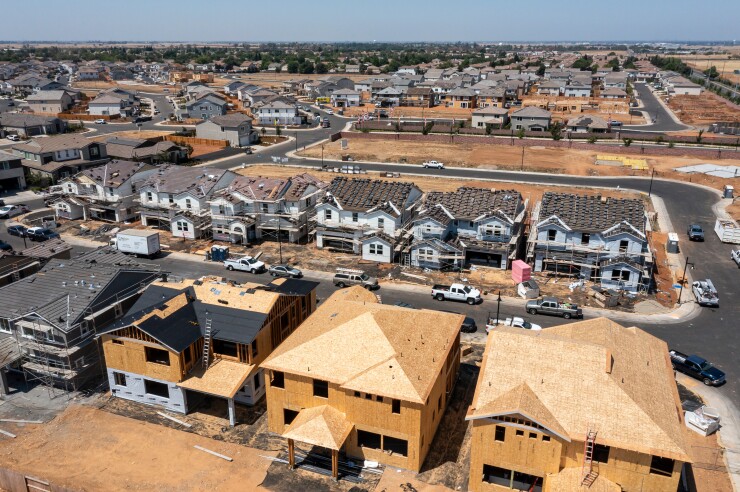President Joe Biden's administration and Senate Democrats are ramping up pressure on the Federal Home Loan Bank system to pump more money into solving the nation's housing crisis.
Senators Catherine Cortez Masto, Elizabeth Warren, Ron Wyden and other lawmakers sent
Deputy Treasury Secretary Wally Adeyemo and Federal Housing Finance Agency Director Sandra Thompson also held a call with executives at the FHLBs last Wednesday to push them to do more to boost housing supply. The conversation was intended to step up pressure on the banks after Treasury Secretary Janet Yellen
"I was disappointed by the lack of additional ideas they had," Adeyemo said in an interview after the meeting. "Ultimately, their regulator and Congress are likely going to have to act."
The outreach comes as Democrats make a case to voters that they're addressing sky-high housing costs. The FHLBs are sitting on tens of billions of dollars in excess capital, partly as a result of the record profit they made propping up regional banks last year. That's made them a target for lawmakers and regulators who argue they should do more to support homeownership and rental housing, especially given government benefits estimated to reach
The home-loan banks are required by law to earmark 10% of their profit for affordable housing programs. As regulators worked on a plan to reform the system last year, the FHLBs voluntarily agreed to increase that amount to 15%.
Although the pledge didn't stipulate a timeline, a review by lawmakers, based on data provided by the FHLBs' own trade group, showed that four of the banks fell short of the 15% mark in 2023.
"The FHLBs' limited affordable housing contributions are especially troubling given the generous compensation currently awarded to FHLB executives and board members," wrote the group of senators, which also included Tina Smith, Tammy Baldwin, Bernie Sanders and John Fetterman.
The FHLBs have met with the administration, lawmakers and others in government in recent months to discuss what more they could do to increase housing supply, Ryan Donovan, president of the Council of Federal Home Loan Banks, said in an emailed statement.
"In all cases, these discussions have been constructive and have highlighted opportunities for innovation as well as regulatory relief that can facilitate the FHLBanks doing more," he said.
The banks expect to devote about $1 billion to affordable housing this year and have initiated three dozen new programs in the past two years to address housing and community development needs, he said.
Focus on mission
The mission of the FHLBs has become hot topic. Congress chartered the institutions during the Great Depression to inject liquidity into struggling thrifts and insurance companies — then major players in the mortgage market. More recently, as Bloomberg News reported in a series of articles, the banks have become a source of low-cost funds for a broad swath of financial firms, many of which do little direct home lending.
The FHFA, the banks' primary regulator, is now seeking to clarify their mission and tie it more directly to housing and community development. A coalition of national advocacy groups have
Yet a recent Supreme Court decision may limit regulators' ability to push through changes on their own, as the Council noted in a letter to the agency last month.
The FHFA has said some reforms it would like to see — including boosting the required payouts for affordable housing to at least 20% of profit — would require an act of Congress.





